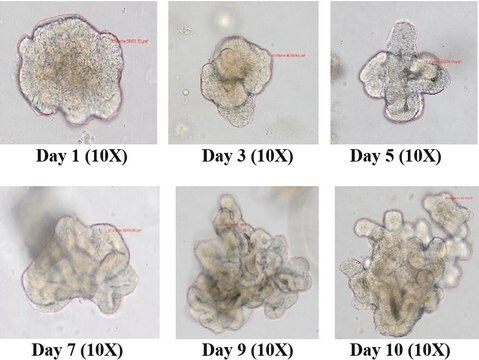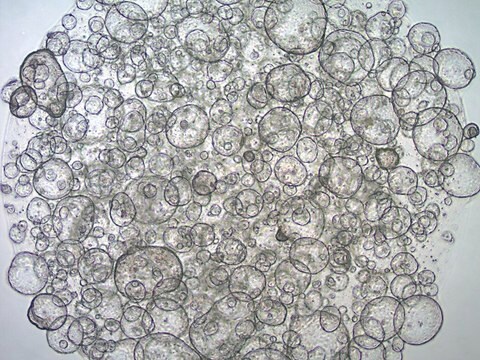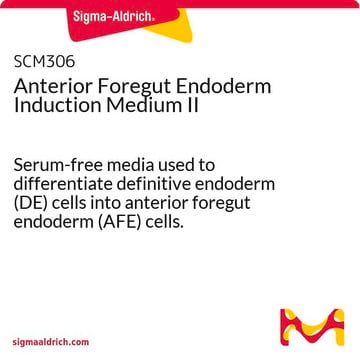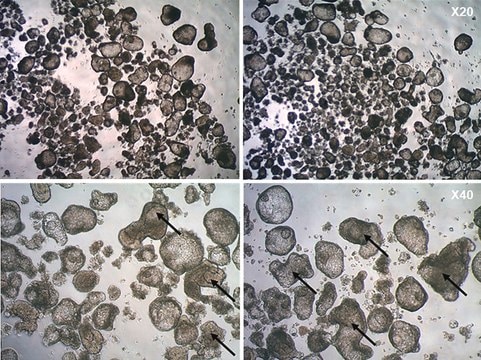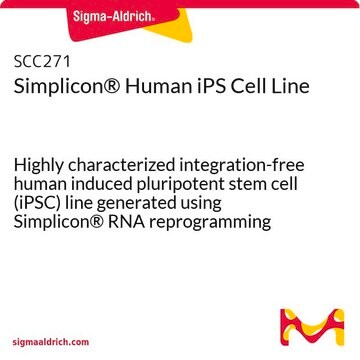SCC300
3dGRO® Human iPSC Derived Colon Organoids
Synonym(s):
Human Colon Organoids, Human Colonoids, Human Gut Organoids, Human Intestinal Organoids
About This Item
Recommended Products
form
liquid
technique(s)
cell culture | stem cell: suitable
application(s)
cell analysis
General description
3dGRO® Human iPSC Derived Colon Organoids are derived from integration-free human iPS cells (Cat. No. SCC271) reprogrammed using the Simplicon RNA reprogramming technology (Cat. No. SCR550). Human iPS cells were differentiated using a multi-step process from definitive endoderm to posterior hind-gut endoderm and eventually into colon organoids (Figure 1.). The organoids express colon-specific markers including the posterior hindgut marker CDX2, a-carbonic anydrase II (CA-II), a-carbonic anhydrase IV (CA-IV), and goblet cell markers Mucin-2 and Mucin-5B. 3dGRO® human iPSC derived colon organoids can be propagated long-term by passaging every 10-12 days using 3dGRO® Human Colon Organoid Expansion Medium (Cat. No. SCM304).
Application
Research Category:
- Cell Culture
- Stem Cell Research
Quality
- Each vial contains ≥1500 organoids.
- Mycoplasma: Negative
- Genotyped by STR analysis: Pass
- Human species verified
- Organoids are negative for HPV-16, HPV-18, Hepatitis A, B, C, and HIV-1 & 2 viruses by PCR.
- Cell viability test: Pass
Storage and Stability
Legal Information
Disclaimer
Storage Class Code
12 - Non Combustible Liquids
WGK
WGK 1
Flash Point(F)
does not flash
Flash Point(C)
does not flash
Certificates of Analysis (COA)
Search for Certificates of Analysis (COA) by entering the products Lot/Batch Number. Lot and Batch Numbers can be found on a product’s label following the words ‘Lot’ or ‘Batch’.
Already Own This Product?
Find documentation for the products that you have recently purchased in the Document Library.
Articles
Human epithelial intestinal colonic organoids can be used as an alternative to Caco-2 drug permeability assays for drug screening and compound toxicity testing.
Protocols
Highly characterized cryopreserved human colonic organoids and a step-by-step organoid culture protocol for epithelial intestinal organoid differentiation from iPS cells.
Learn how to cultivate similar-sized iPSC-derived colon organoids using Millicell® Microwell plates and perform a forskolin-induced swelling assay.
Learn how to cultivate similar-sized iPSC-derived colon organoids using Millicell® Microwell plates and perform a forskolin-induced swelling assay.
Learn how to cultivate similar-sized iPSC-derived colon organoids using Millicell® Microwell plates and perform a forskolin-induced swelling assay.
Related Content
Our broad range of the most trusted tools for cell culture includes stringently sourced and tested FBS, established media formulations, and sterile labware. Cutting-edge techniques using stem cells and 3D matrices are enabled by organoids, hydrogels, culture scaffolds, and bioinks for 3D bioprinting.
Our broad range of the most trusted tools for cell culture includes stringently sourced and tested FBS, established media formulations, and sterile labware. Cutting-edge techniques using stem cells and 3D matrices are enabled by organoids, hydrogels, culture scaffolds, and bioinks for 3D bioprinting.
Our broad range of the most trusted tools for cell culture includes stringently sourced and tested FBS, established media formulations, and sterile labware. Cutting-edge techniques using stem cells and 3D matrices are enabled by organoids, hydrogels, culture scaffolds, and bioinks for 3D bioprinting.
Our broad range of the most trusted tools for cell culture includes stringently sourced and tested FBS, established media formulations, and sterile labware. Cutting-edge techniques using stem cells and 3D matrices are enabled by organoids, hydrogels, culture scaffolds, and bioinks for 3D bioprinting.
Our team of scientists has experience in all areas of research including Life Science, Material Science, Chemical Synthesis, Chromatography, Analytical and many others.
Contact Technical Service